Being pregnant in the middle of a global pandemic never worried Stacey Knights much. The 27-year-old, from Middlesbrough, assumed from what she’d been told – and read – that if she did contract Covid, she’d have nothing worse than a bout of bad flu.
‘Midwives never really spoke to me about Covid, or told me being pregnant meant I was at risk or anything,’ says Stacey, a social worker. ‘I’m not old or sick, so if I got it I thought I’d be totally fine.’
But in January, three months into her pregnancy, she contracted the virus at work. A few days later she was taken to hospital by ambulance. ‘I was terrified,’ she says. ‘I felt like I had been hit by a train. I was vomiting all the time and my temperature was sky-high.’
While her breathing remained stable, tests showed that Stacey’s immune system had gone haywire. She had developed a dangerous kidney infection and was at risk of a potentially fatal clot – pregnant women are already five times more likely to develop a serious blood clot compared with the average person.
Doctors administered an emergency dose of intravenous fluids and blood-thinning drugs, as well as steroids to stop her immune system going into overdrive. She avoided intensive care, but doctors kept her in for three days to monitor her and the baby.
‘When I was discharged I had to keep injecting steroids for a month, which made me sick and exhausted,’ she says. ‘I was so scared for my baby, but thankfully it looks like she’s stayed healthy. I never expected I’d get so ill.’
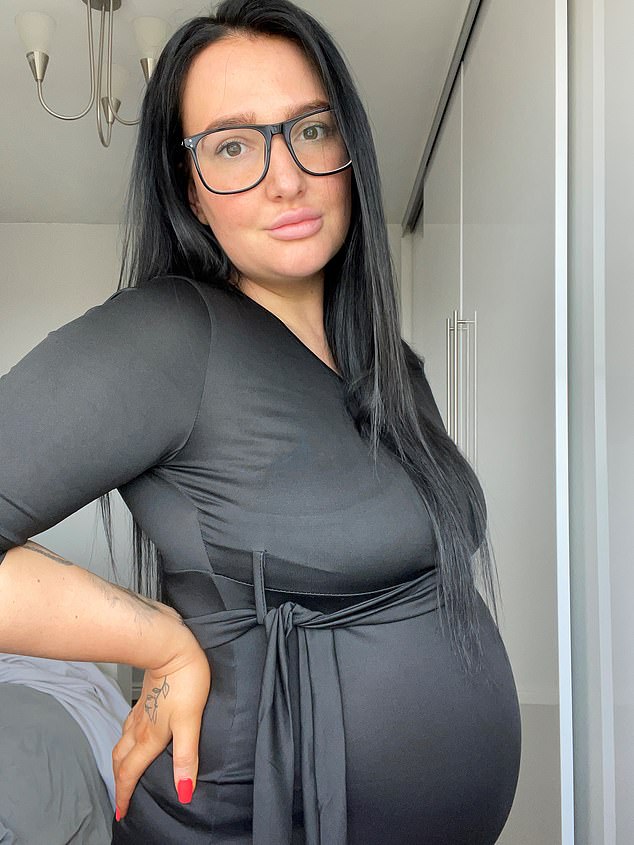
In the dark: Stacey Knights, 27, from Middlesbrough, says she wasn’t advised to get the jab despite her ‘terrifying’ Covid ordeal
Worryingly, despite Stacey’s ordeal, she’s opted against having a Covid-19 jab to protect her against another infection, mostly due to what she terms ‘a lack of long-term data on unborn babies’.
But her midwives didn’t advise her to reconsider. In fact, they barely advised her at all. ‘Not one midwife, health visitor or antenatal consultant reassured me,’ she says. ‘They all seem to be adamant you should get other vaccines when you’re pregnant, like for the flu and whooping cough. Whereas with Covid vaccine, it’s all very blasé and “Oh, it’s up to you”. They’re very relaxed about it.
‘The midwife even said that if I was planning to breast-feed I should probably wait until after the baby had been weaned to have a Covid test, which put me off even more.’
Stacey’s story is becoming all too familiar with doctors up and down the country, as soaring numbers of pregnant women are admitted to hospital, critically ill with Covid.
On Thursday, a University of Oxford analysis of hospital figures showed the number of pregnant women admitted with Covid has jumped seven-fold since May – from 28 per week to 200.
Last week, Dr Kevin O’Kane, a consultant in acute medicine at a Central London hospital, said he recently had six pregnant women on his Covid ward. Other intensive-care doctors have told this newspaper that roughly ten per cent of their patients are pregnant women who are ‘otherwise healthy’.
‘The numbers are rising quickly,’ says one intensive-care doctor in the Midlands. ‘The babies often have to be delivered prematurely by emergency caesarean because the mother is so ill.’
And 99 per cent of these Covid victims are unjabbed, according to an analysis of NHS data by University of Oxford researchers.
Fewer than one in 12 pregnant women have come forward for their jabs.
Now experts and campaigners have accused NHS maternity staff of spreading ‘misinformation’ about vaccines and underestimating the risk of the virus to pregnant women – who, in fact, are ten times more likely to be hospitalised than the average person.
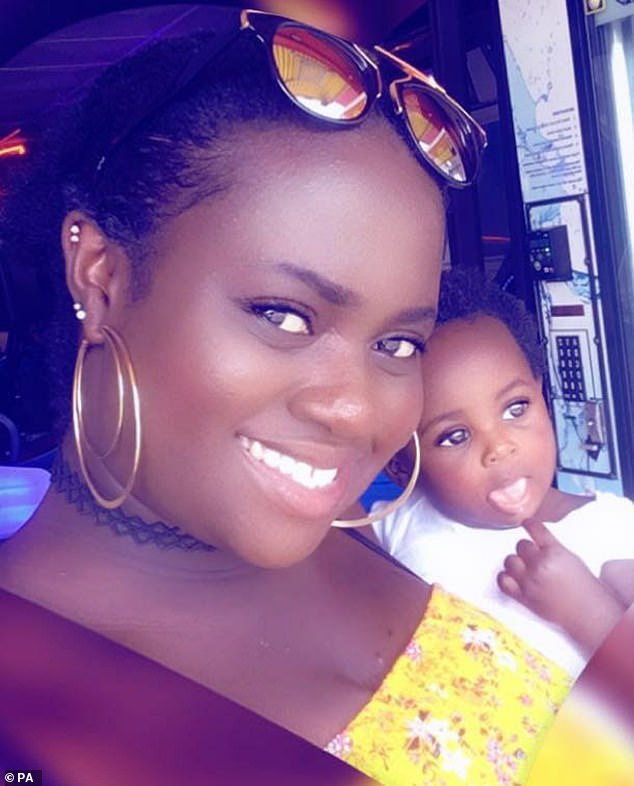
Raised risk: Specialist nurse Mary Agyapong was 35 weeks pregnant when she died after contracting Covid-19 at work
This, they say, explains the soaring numbers of hospitalised expectant mothers and premature, ill newborns.
Professor Adam Finn, a paediatrician and member of the Government’s Joint Committee on Vaccination and Immunisation (JCVI), says: ‘Midwives have been hesitant to tell their patients to get the vaccine. They are naturally cautious and want to protect the unborn baby. Many worry that we don’t yet know about the effect on the child, not realising we have enough data from other vaccines to know it’s unlikely to be a problem.’
Meanwhile, some women have reported comments from maternity staff that border on anti-vaccination propaganda.
The Mail on Sunday has learnt of pregnant women whose midwives have advised them to avoid the vaccine because it could be ‘another thalidomide’ – the now-banned morning sickness drug that caused disability in children in the 1960s. Others have been told it could increase the chance of miscarriage.
COVID FACT
More than a third of pregnant women who were hospitalised with Covid in the past three months also developed pneumonia.
Advertisement
Joeli Brearley, founder of the maternity charity Pregnant Then Screwed, said: ‘We get lots of women saying it’s their midwives, health visitors or GPs putting them off. Some of the things pregnant women are being told by NHS staff are shocking.
‘There is a lot of misinformation out there, sadly, and we are hearing that health professionals just don’t have the facts on hand to be able to give accurate information.’
A survey of 9,000 pregnant women in the UK carried out by Pregnant Then Screwed found that more than three-quarters said health staff had failed to recommend vaccination during appointments. These results, seen exclusively by this newspaper, come as Jacqueline Dunkley-Bent, the Chief Midwifery Officer for England, has penned a letter to all midwives and GP practices urging them to encourage pregnant women to get the jab.
Last night, Gill Walton, chief executive of the Royal College of Midwives, said that staff must ‘keep up to date with official advice and guidance’ and ‘provide women with evidence-based facts and not their own personal beliefs’.
Much of the vaccine hesitancy is likely to be rooted in the fact that, initially, the JCVI advised that only pregnant women who were at high risk from Covid should get the jab.
Pregnant women were not included in the vaccine safety trials – as is standard. But when data later came through from 130,000 pregnant women in the US that showed the jab to be safe and effective, the JCVI changed its guidance that mothers-to-be should be offered the vaccine at the same time as everyone else in their age group.
Experts say this initial delay planted the first seed of doubt in the minds of pregnant women and those caring for them.
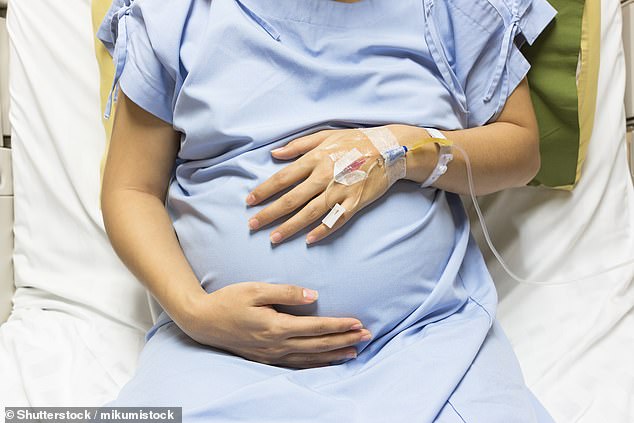
A University of Oxford analysis of hospital figures showed the number of pregnant women admitted with Covid has jumped seven-fold since May – from 28 per week to 200
‘In countries such as the US and Israel, pregnant women were allowed to choose to have the vaccine if they wanted from very early on,’ says Dr Teresa Kelly, a consultant obstetrician at Manchester University NHS Foundation Trust. ‘The JCVI took a more cautious approach. But it has backfired because what women heard first was that they shouldn’t have the vaccine. You can understand this might make some think there was something wrong with the jab.’
But when the JCVI guidance did change, in April, the UK’s main maternity health bodies – The Royal College of Midwives (RCM) and The Royal College of Obstetricians and Gynaecologists (RCOG) were slow to update their advice.
Until last week, RCOG’s official recommendation was that pregnant women should ‘strongly consider’ vaccination. However, following the worrying rise in hospitalisation in pregnant women, this was changed to ‘recommends’.
Joeli Brearley says the changing advice has confused mothers-to-be. ‘It’s only been in the past few days that we’ve seen the bigger organisations come out and say, we recommend now that pregnant women have it. With the information and guidance changing so quickly, it’s really difficult for [pregnant women] to keep on top of all that information.’
COVID FACT
Pregnant women who contract Covid are 76 per cent more likely to develop the potentially deadly condition pre-eclampsia.
Advertisement
Asma Khalil, professor of obstetrics and a spokesman for RCOG, told The Mail on Sunday’s Medical Minefield podcast: ‘We are now getting safety data on vaccines and pregnancy. We know that the vaccine causes no increased risk of stillbirth and miscarriage, so it’s absolutely the right time that we should have a clear message.’
Some experts say the risk to pregnant women from the virus itself has been underestimated since the start of the pandemic.
Dr Viki Male, an immunologist at Imperial College London who is studying Covid infections and vaccines during pregnancy, believes expectant women should have been considered vulnerable and given vaccine priority. ‘That would have been a good idea,’ she says. ‘It should have been treated as if you had asthma.’
Last spring, official guidance suggested Covid presented no increased risk to pregnant women. NHS England leaflets stated there was ‘currently no evidence that pregnant women who get coronavirus are more at risk of serious complications than the general population’.
The leaflet, which was written in partnership with RCOG, added that there was no proof that Covid ‘increases the risk of miscarriage’. Pregnant women were identified as a vulnerable group, but campaigners say the risks were not clearly communicated via NHS staff.
Marian Knight, Professor of Maternal and Child Population Health at the University of Oxford, has been tracking hospitalisations in pregnant women since the beginning of the pandemic.
She says: ‘We’ve known for quite a while, as early as June 2020, that pregnant women are vulnerable to complications from Covid-19, whether that’s complications to the pregnancy or to the woman’s wellbeing. When the Alpha [formerly Kent] variant arose in the winter, the problem became more evident, and now, with the Delta [Indian] variant, it has become even more of an issue.’
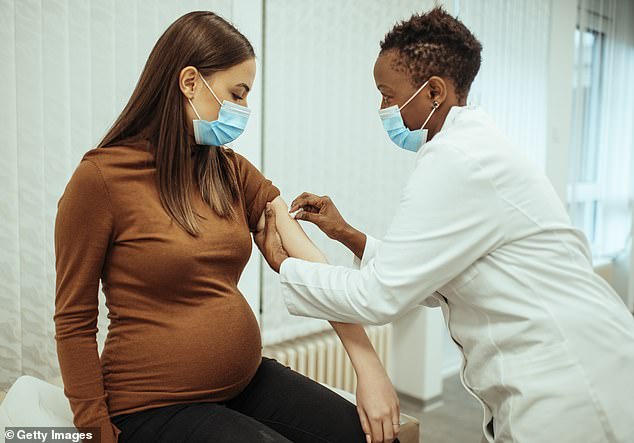
Until last week, RCOG’s official recommendation was that pregnant women should ‘strongly consider’ vaccination. However, following the worrying rise in hospitalisation in pregnant women, this was changed to ‘recommends’ (file photo)
Prof Knight says there was a good case for prioritising pregnant women for the Covid vaccine before non-vulnerable adults. ‘I presented data to Sage before the JCVI decision and said the risk of pre-term births should be considered in the decision,’ she says.
‘Countries such as Israel and Canada had already taken note of this danger and had decided to prioritise pregnant women. But the JCVI primarily based its call on individual mortality rates, which thankfully are low in pregnant women.’
According to Prof Knight, less than one per cent of pregnant women hospitalised with Covid die. Though she adds: ‘But the long-term consequences of recovering from intensive care while also caring for a newborn is something no one should be put through.’
Many will remember the death of Mary Agyapong, who was 35 weeks pregnant when she died in April 2020. The 28-year-old contracted Covid at Luton and Dunstable Hospital, where she worked as a specialist diabetes nurse, before she became critically ill and was forced to undergo an emergency caesarean section to save her baby – later named Mary.
Been (wrongly) put off the jab?
Write and tell us at [email protected]
Advertisement
After being admitted to intensive care, she suffered a cytokine storm – where the body’s immune system attacks its own cells – which led to a cardiac arrest. She never held her child.
According to her husband, trainee barrister Ernest Boateng, his wife was never told she may be vulnerable. ‘If we had known there was even the slightest risk pregnancy would make her more likely to be sick, she wouldn’t have set foot in that hospital,’ he says.
At the inquest into her death in March, Mr Boateng says doctors noted the link between severe Covid illness and late stages of pregnancy. He says: ‘Doctors said the pregnancy and then her caesarean caused the immune system to go haywire, which is one of the reasons she spiralled so quickly.’
In March, data from more than 41,000 pregnant women with Covid found they were twice as likely as non-pregnant women to end up in intensive care. While the risk of death is low, studies have shown that they are nearly three times more likely to have a premature baby or suffer a stillbirth. The majority needing hospital treatment are in the third trimester of their pregnancy, when the pressure on their bodies is at its highest.
Joeli Brearley says: ‘Pregnant women have been given the wrong advice from the very start.
‘Many still don’t know they’re more likely to get very ill if they get Covid. If it was communicated properly by healthcare professionals and the Government, lives would have been saved.’
Both Ms Brearley and Mr Boeteng hope instructions from England’s top midwife will force maternity staff to deliver the right messages. But it will be a challenge.
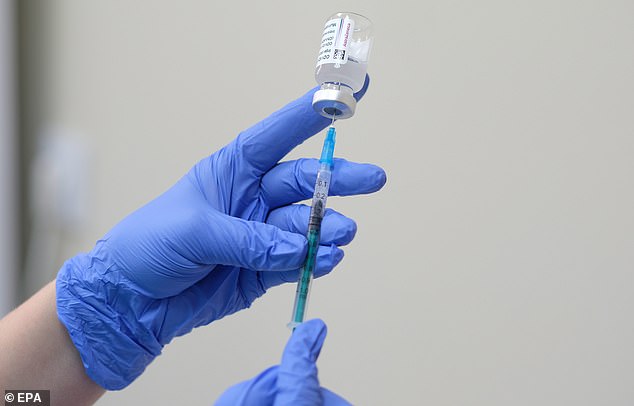
Much of the vaccine hesitancy is likely to be rooted in the fact that, initially, the JCVI advised that only pregnant women who were at high risk from Covid should get the jab (file photo)
‘When the trust has gone, how do you convince people you know the way forward?’ says Mr Boeteng.
‘We’re in a very difficult place right now. I guess I’d just tell people, “I’ve lost my wife, and now I’m left with two children all alone. I wish I had all the knowledge I do now.”
‘And I wish Mary had the chance to take the vaccine.’
In a statement, Gill Walton, head of the Royal College of Midwives, said: ‘A midwife’s first duty is to protect the health and wellbeing of the pregnant women they care for.
‘All maternity staff should be aware that they need to be advising women that vaccination against Covid-19 is safe in pregnancy and while breast-feeding.
‘Since the start of the pandemic the RCM, together with the RCOG, have been producing advice and guidance for both maternity staff and pregnant women about how best to protect themselves. This also included recommendations to get the vaccine as soon as they were able to.’
Source link : https://www.dailymail.co.uk/health/article-9847283/Number-pregnant-women-admitted-hospital-Covid-jumped-SEVEN-FOLD-May.html











